comments:
I thought people would enjoy this article because Golden Palace (a online gambling website) took creative marketing to the NEXT level!! You can't deny how impressive these numbers are: "Through
its creative efforts, GoldenPalace was able to stretch a couple million
dollars worth of marketing expenditures into an estimated $30 million in ad value" however these are some of the craziest marketing efforts I have ever seen and obviously not suited to many companies! I loved how they used television in a completely unique way to drive traffic digitally - which is what we have talked about in class. The buying of weird ebay bids is perhaps the most surprising and clever marketing they did, "As
GoldenPalace won bids for Jesus-shaped pretzels, pregnancy tests, and
haunted walking canes, they continued to reap the rewards of tremendous
publicity. Membership on their site ballooned to 2.5 million users, and
they become -- far and away -- the most recognizable brand name in
online gambling. After most bids, its website saw traffic boosted by as
much as 25%". There is a lot to learn from what golden palace did and just shows that you can be very creative when it comes to digital marketing!
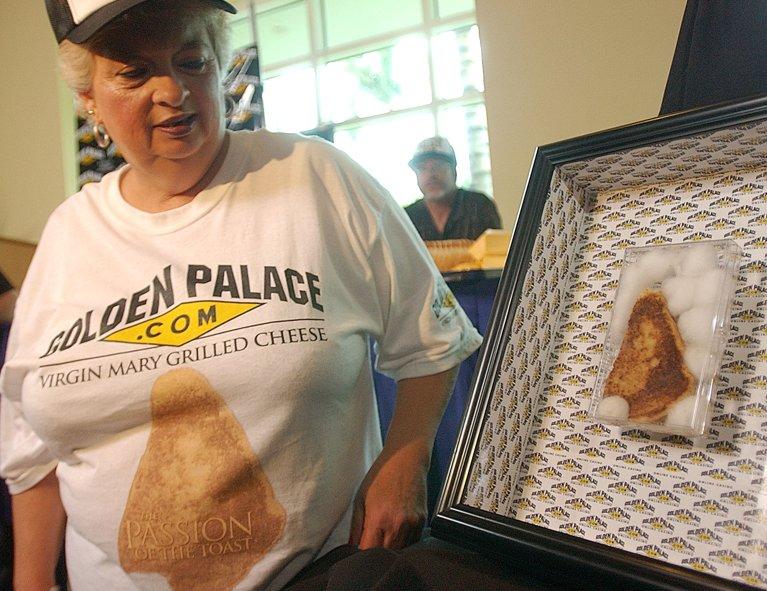
"We aim to amuse, because if people laugh, they'll remember."-- Richard Rowe, CEO of GoldenPalace.com
It’s one of the oldest mantras in the marketer’s handbook: do crazy shit, and you’ll eventually get attention.
For
centuries, companies have enlisted unusual, flashy, and often downright
distasteful techniques to drill their products into the public’s eye --
and for advertisers, it’s often just part of the visibility game. As
the saying goes, “there is no such thing as bad press.”
But
in the annals of PR history, perhaps no other company so consummately
mastered art of garnering attention as GoldenPalace.com.
At
its peak in the mid-2000s, Canadian-operated GoldenPalace was one of
the three most profitable gambling sites in the world. It boasted 2.4
million active users, more than $80 million a year in revenue, and was
growing at a healthy rate of 5 percent a month, according to industry
analysts. And it was all thanks to their incredibly strange marketing
approach.
At the time, online gambling lived in a hazy
legal zone. Despite GoldenPalace’s offshore operating platform in the
Caribbean, the Canadian and U.S. governments considered the site
illegal; as a result, most major print and broadcast outlets had steered
clear of running advertisements for the site. GoldenPalace had to find
an alternative solution -- and its CEO, a cantankerous 60-year old
ex-trust management executive, did just that.
What resulted was some of the weirdest, and most effective, marketing ploys ever conceived.
Ploy 1: Tattooing Boxers

Boxer Bernard Hopkins displays the temporary henna tattoo that earned him $15,000
Shortly
after founding GoldenPalace.com in 1997, Richard Rowe -- the company’s
CEO and sole investor -- enlisted the help of Cyber World Group, a tiny
Canadian marketing firm, to rouse public interest in the gambling site.
With just three employees and no big-name clients, Cyber World was a
complete unknown in the marketing world. This would soon change.
Rowe
knew that in order to circumvent strict laws against online casino
advertisements, he’d have to rely on good, old-fashioned publicity
stunts -- and Cyber World knew just where to begin.
A rapidly-approaching boxing match
between Bernard ‘The Executioner’ Hopkins and Felix ‘Tito’ Trinidad was
the talk of the nation; filmed in Madison Square Garden, it would be
one of the most-watched sporting events of the year -- but GoldenPalace
was unable to run an ad on the network. Instead, Drew Black, Cyber
World’s head of marketing at the time, decided to put the ad somewhere
else.
In September 2001, he approached Hopkins, a famed
middleweight, and asked him if he’d be willing to sport a giant
temporary tattoo of GoldenPalace across his back during the match; to
the tune of $15,000, the boxer agreed. Though Hopkins sweat off the
temporary tattoo after only a few rounds, it piqued the curiosity of
millions of viewers, and thoroughly pissed off the fight’s broadcasters.
The stunt was a success: major outlets like USA Today and The Howard Stern Show hotly debated the legality of body advertisements, and the media clamored to cover this “extraordinary new marketing method.”
In the aftermath, the Nevada Athletic Commission outlawed such tattoos on boxers. Unfazed, GoldenPalace took them to court and reversed the ban, which was found to be an infringement of free speech under the First Amendment. In a statement, GoldenPalace’s lawyer garnered the company even more attention:
"It's a victory for free speech, really. It's a victory for boxers. Now they can make money for themselves with their own bodies. It also rewards companies like ours that come up with unique ways to advertise."
Following
the court ordeal, GoldenPalace continued to shell out money to those
willing to don the company’s name. In one 2002 episode of the top-rated
television show Celebrity Boxing, Tonya Harding, Todd Bridges,
and Danny Bonaduce (all well-known celebrities) were each paid sums in
the “low five figures” to wear the henna tattoos. Fox, the network
airing the show, was paid nothing -- and GoldenPalace, for a very
reasonable sum, was able to expose its brand to 155 million viewers. As a
result, the company’s web traffic increased by 200% in the 24 hours following the episode.
"It's frightening that advertisers would literally brand people," a spokesman for watchdog group Commercial Alert told USA Today
the following morning. "It's a perfect example of commercialism: that
everything should be for sale, including the skin on a person's back."
Of
course, GoldenPalace’s spokesman was armed with a coy response: "Has
anybody been more of a billboard for a company than Michael Jordan with
Nike?"
By the end of 2002, GoldenPalace had “sponsored” more than 25 boxers,
paying each an average of $5-10,000. Bernard Hopkins, who remained the
company’s “golden boy,” racked up over $100,000 for his succession of
displays throughout the year.
As a result,
GoldenPalace saw a tremendous upswing in media attention, traffic, and
brand recognition. Then, once the novelty factor ran out, the company
segued into its next strange phase.
Ploy 2: Streakers
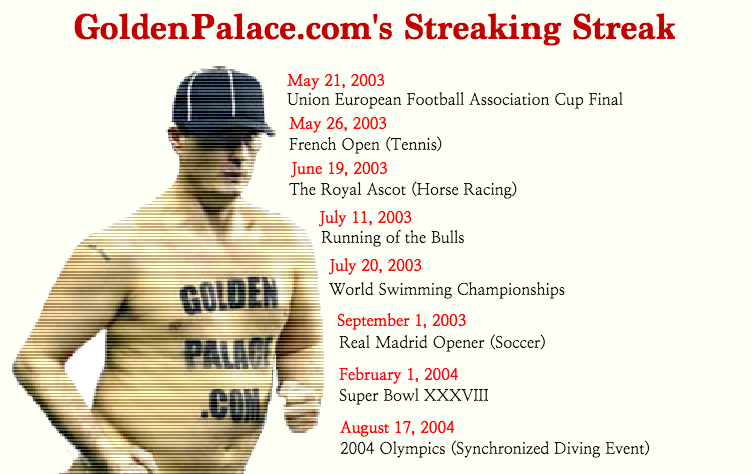
Priceonomics; Data via Google Archives, GoldenPalace
Throughout the 1990s, a British man named Mark Roberts
had gained attention for his own strange efforts. Lauded by the press
as a “professional streaker,” he’d donned his birthday suit at the likes
of the ‘96 London Marathon, the Miss World Competition, Wimbledon, and
dozens of high-profile soccer matches in England -- usually, just for
the hell of it.
He was a man on a mission. He was a man
with no shame. And, inevitably, he was a man who caught the attention
of GoldenPalace.com.
In May 2003, the online casino
paid Roberts an undisclosed sum of money (likely around $5,000) to
streak naked across the field at the Union European Football Association
Cup Final with the company’s web address splayed across his back
(complete with “click here,” and an arrow pointing you-know-where). The
match, contested between Celtic (Scotland) and Porto (Portugal), was one
of the biggest of the season -- 52,000 packed the stadium and an
estimated 10 million tuned in via various television networks worldwide. As recounted by the LA Times, Roberts was prominently featured:
“The unidentified man, dressed in a breakaway assistant referee's outfit, jogged onto the field just as the second half was about to begin, flashed a red card in front of the referee, and then flashed everything else at the Estadio Olimpico crowd and the worldwide TV audience.The cameras even followed him in full-frontal glory as he ran across the field before being collared by security. It was just a publicity stunt by a casino, but not a pretty sight. “
"Whoops,"
Fox Sports announcer Max Bretos said on live television. "What do we
have? Some good advertising there for...the casino?”
Quickly,
GoldenPalace settled into their new niche: streaker marketing. Over the
ensuing four months, in rapid succession, they sent Roberts on a
European tour of events -- the French Open, the Running of the Bulls,
the Swimming World Championships -- all of which he attended nude, save
for a gaudy, gigantic henna tattoo of GoldenPalace featured on various
spots of prominence on his body.
At Berkshire’s prim-and-proper Royal Ascot, with the Queen and Prince of Wales in attendance, Roberts disrupted the the formal ceremonies in grand fashion:
“The streaker arrived at the event dressed in elaborate drag, wearing a full-length black batwing dress. At 3:40 PM local time, he jumped onto the track as the horses and riders were warming up for the main race. Pretending to be intoxicated, Roberts stumbled around the track while slowly performing a strip tease for an increasingly appreciative crowd. Then, Roberts removed the rest of his clothing and ran along the track smacking his rump and galloping along with the horses that sped past him. Roberts' antics won the crowd over as they cheered and laughed before security removed him from the track.”
In
February 2004, GoldenPalace successfully pulled off their biggest
marketing stunt to date. Just before the second half of Superbowl
XXXVIII (and right after the infamous half-time show
that made “Janet Jackson” the most searched-for term in Internet
history), Mark Roberts sprinted out onto the field and proceeded to tear
off his clothing.
For a full half-minute, he pranced
before a television audience of 144.4 million -- the biggest viewership
in Super Bowl history at that point. The average 30-second spot that
year was $2.2 million; GoldenPalace received the same exposure for less
than $10,000 -- and was discussed for weeks afterward on popular
programs like Late Show with David Letterman.
Immediately following the stunt, ComScore Media Metrix showed a 380% spike in GoldenPalace’s website traffic.
Then, in proper fashion, GoldenPalace got even weirder.
Ploy 3: Buy Weird Stuff for Outrageous Prices

GoldenPalace reps pose with William Shatner after purchasing his kidney stone for $25,000
In July 2004, still riding high on the success on its super bowl infiltration, GoldenPalace went more guerilla than ever before.
A
month earlier, the UEFA European Championship had begun -- one of
soccer’s most-watched tournaments. To great media fanfare, a “new and
improved” soccer ball design was introduced; when David Beckham,
England’s star player, dramatically missed a penalty kick in a
qualifying match, it became international news. The fan who secured the
ball took to online auction house eBay to sell it. Lo and behold, the
winning bid -- at £28,000 (roughly $35,000 USD) -- came from a bidder simply identified as “GoldenPalace.”
After
winning the bid, the company announced it would give soccer fans the
opportunity to kick a penalty shot with the ball. It organized the
“Beckham Ball Shoot-Out,” and stipulated that in order to enter, fans
would have to send an SMS text message -- at a rate of $0.25 -- to a
hotline number; from these texts, three fans would be selected to
participate. In less than two weeks, 300,000 texts were registered.
To
generate even more hype, GoldenPalace then partnered with a Polish TV
network, and agreed to donate all proceeds from the event to a
children’s hospital in Krakow. The shoot-out, held in Poland’s largest
arena, was a sell-out success, and eventually generated more than
$160,000 for charity, making GoldenPalace something of a hero not only
in Poland, but across Europe.
The shady online gambling
site had managed to brand itself as an upstanding, charitable
benefactor. Smitten with the attention the stunt had generated,
GoldenPalace embarked on a two-year voyage to swoop up auctions on eBay
-- all in the hopes of generating publicity:
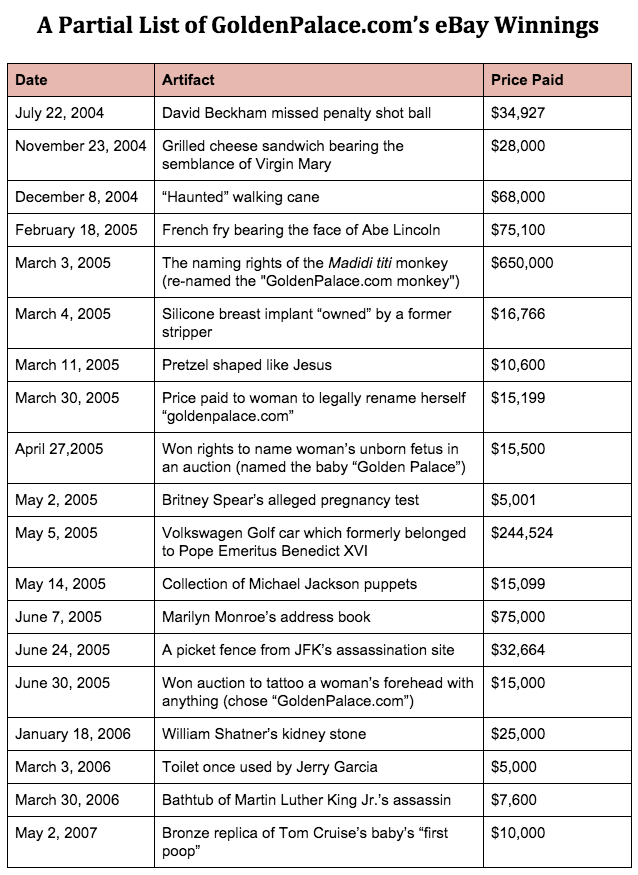
Priceonomics; via Google Archives
When
Diana Duyser, a 52-year-old from Hollywood, Florida, realized that a
piece of toast she was eating bore the visage of Virgin Mary (see cover
photo), she immediately encased it in plastic. For 10 years, it hung by
her nightstand, supposedly offering religious guidance and good luck.
Then, in November 2004, she took to eBay to sell it to the highest
bidder.
"I do believe that this is the Virgin Mary Mother Of God," she proclaimed in her original ad, “that is my solemn belief.”
The
media had a field day with the toast: soon, it had become one of the
most-viewed auctions in internet history, with 1.7 million page visits,
and over 89,000 Google results. GoldenPalace, realizing an opportunity
to poach some of this attention, made sure to win the bid for a healthy
sum of $28,000.
In the ensuing months, the gambling site racked up dozens of eBay purchases -- each seemingly weirder than the last.
When
the Wildlife Conservation Society discovered a new species of monkey in
Bolivia and put up the naming rights for bidding at a charity auction,
GoldenPalace seized the opportunity. For $650,000, the company named the
creature “the GoldenPalace.com monkey” (or Callicebus aureipalatii). The money went to Bolivian charities.
"We are happy to have this opportunity to help out a very worthy cause" GoldenPalace.com’s CEO, Richard Rowe, told reporters.
" Hundreds, even thousands of years from now, the GoldenPalace.com
Monkey will live to carry our name through the ages. Naming this species
has bought us scientific, as well as virtual immortality."
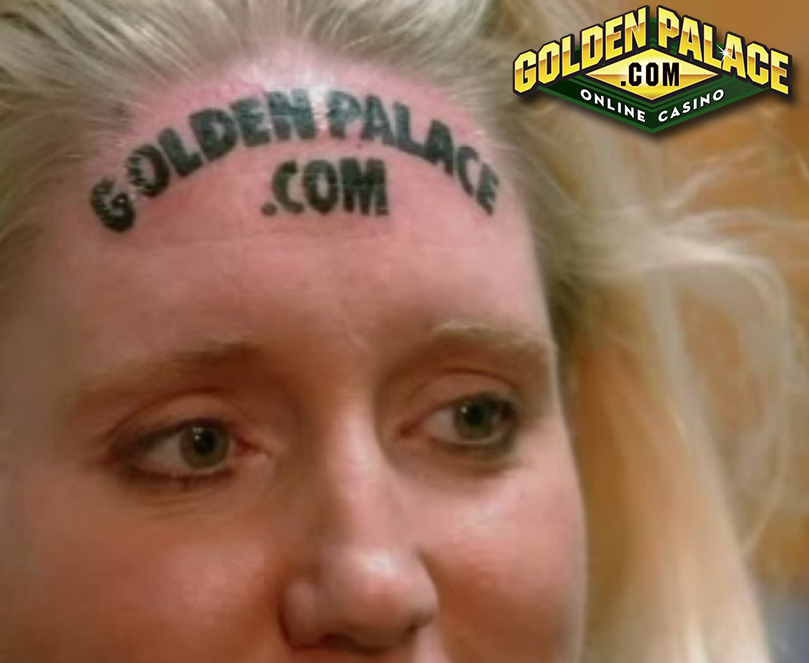
Kari Smith tattooed her forehead for $15,000
It
wouldn’t be the last time the company bid for naming rights. In March
2005, they paid $15,199 to legally rename a woman “goldenpalace.com.”
Again, in April, they shelled out $15,500 to name a financially struggling English woman’s then-unborn fetus -- a move which many saw as crass and inhumane.
“It’s different,” the woman uneasily told reporters of her daughter’s new name, Golden Palace Benedetto. “It’s definitely...unique.”
“This has truly become a phenomenon that has changed the way people think about marketing,” CEO Richard Rowe chimed in, by the woman’s side at a press meeting. “It seems like there are no limits to what can be advertised.”

Associated Press Headline; April 30, 2005
He appeared to be right.
As
GoldenPalace won bids for Jesus-shaped pretzels, pregnancy tests, and
haunted walking canes, they continued to reap the rewards of tremendous
publicity. Membership on their site ballooned to 2.5 million users, and
they become -- far and away -- the most recognizable brand name in
online gambling. After most bids, its website saw traffic boosted by as
much as 25%.
To
maintain public interest, they had to find progressively weirder things
to buy. "It's always hard to top the last one," Richard Rowe admitted
in a 2005 interview, "but somehow we come up with something."
For
a mere, $25,000, they became the proud owners of William Shatner’s
kidney stone. The picket fence supposedly perched across the street from
JFK’s assassination site was swooped up for $32,664. GoldenPalace even
shelled out $5,000 for a toilet once used by Grateful Dead frontman,
Jerry Garcia. To ensure maximum publicity potential, company staffers
would would to flag auctions that already seemed to be getting a lot of
traffic (its purchase of Pope Benedict XVI’s grey Volkswagen Golf for
$244,591 was provoked by the fact that the auction had received 8.4 million hits -- the most in eBay’s history).
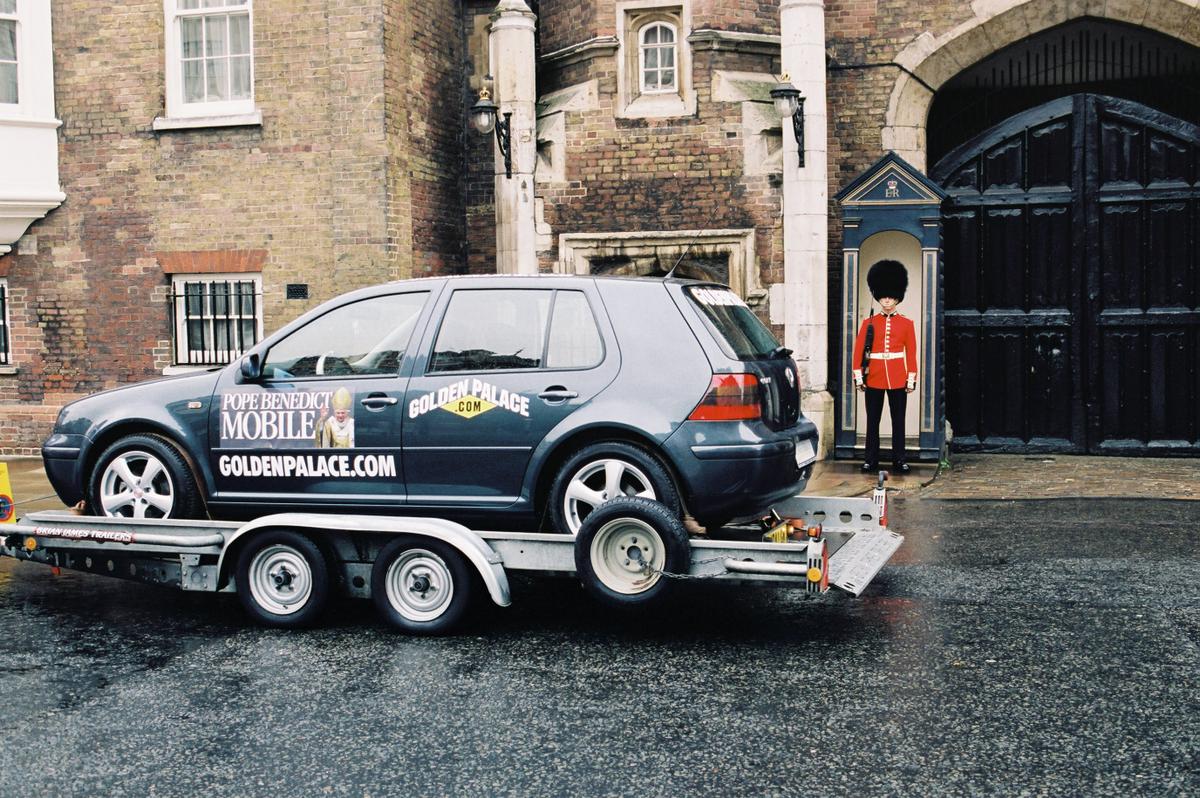
Pope Benedict XVI's Volkswagen Golf, purchased by GoldenPalace for a whopping $244,591
Often,
the authenticity of the items the company purchased was questioned by
experts. For instance, when they paid a homeless man $10,000 for a
supposed Titanic artifact in 2004, historians were quick to point out
the item was “clearly” fake -- but that didn’t seem to matter to
GoldenPalace. “Well,” a spokesman told the Dallas Morning News, “I guess
the publicity takes the edge off really caring, right?”
The
publicity also brought on hoards of prospectors looking to cash in on
their strange finds. “I get over 100 emails a day over a used Kleenex or
a cloud that looks like the pope,” Drew Black, a member of
GoldenPalace’s marketing team, toldChicago Magazine. “It can be overwhelming.”
Eventually,
as if following in the footsteps of P.T. Barnum, GoldenPalace set off
on a North American tour with its truck full of oddities. The 20-city
extravaganza raised more than $300,000 for charity.
The Champion of Guerrilla Marketing
Through
its creative efforts, GoldenPalace was able to stretch a couple million
dollars worth of marketing expenditures into an estimated $30 million in ad value.
“We just had fun with it,” Steve Baker, GoldenPalace’s marketing liaison, later told a poker magazine.
“Our marketing is about trying to have fun and make people laugh. It’s
what I call 'advertainment.' We want people to say, ‘I wonder what
Golden Palace is going to do next.’”
In the spirit of
its business, each of GoldenPalace’s eBay purchases was like a little
bet -- a small gamble. They didn’t know for certain whether or not
something would garner attention, and that was a risk they had to
continually take. But in the end, despite much industry criticism,
things seemed to work out.
"We're not crazy," added
Baker. "Everyone was saying, 'Look at these idiots, they spent all this
money on a sandwich…[but] the amount of exposure we got far exceeded the
amount of money we spent."
After an extensive online
gambling ban was enacted in the U.S. in 2006, the once-limelighted
company seemed to entirely disappear from the media. Aside from one or
two minor publicity stunts (ie. the purchase of Justin Beiber’s hair for
$40,000 in 2011), GoldenPalace sunk into the depths of obscurity --
most likely to maintain a more underground status. Today, the website
operates under game licensing company IGSOnline, and is banned in the
USA, Canada, and most of Europe.
But for a brief moment
in time, GoldenPalace was the king of guerrilla marketing -- and in a
new era of advertising, their efforts continue to survive in weird,
somewhat disturbing vignettes.
"In today's world, to
get attention is the hardest single thing to do, given the media
environment," UC Berkeley marketing professor Rashi Glazer later told Wired. “It's the hardest thing to do, and they did it.”
No comments:
Post a Comment